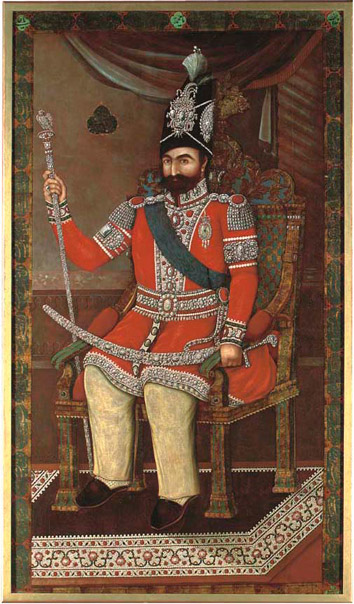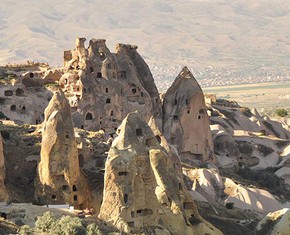The views expressed in our content reflect individual perspectives and do not represent the authoritative views of the Baha'i Faith.
While Baha’u’llah was making clear to the Babis that he was God’s new messenger, he also made a stunning and prophetic series of announcements to the political and religious leaders of the world.
While in exile in Adrianople, Baha’u’llah sent a series of letters and tablets to the great rulers of his day, announcing the advent of the Day of God, calling upon the kings and rulers to end tyranny and oppression and to establish justice and peace in the world. This series of announcements would continue after he left the city on the next stage of his exile.
The nineteenth century was a period of unbridled ambition on the part of the great nations and empires. During this era they jockeyed for positions of eminence as world powers. Alliances were made and broken, wars fought, and huge territories absorbed, all in the name of national destiny. Despots, in whose hands absolute power was concentrated, ruled most nations. These rulers, in the main, considered their power to have been conferred upon them by God. It was, they believed, their divine right to rule, and their goal was to gain wealth and power in God’s name.
In this mission they found support among the academics, intellectuals, press, and other leaders of their day. That this meant indescribable hardship for the masses of humanity, and even their own subjects, they considered a necessary evil. These sovereigns did not welcome bold challenges from their subjects. Particularly in the East, where they had the power of life and death over all, rulers seldom entertained direct accusations against them. Those individuals who dared to speak out typically met a grim fate. Then Baha’u’llah, a prisoner, himself a victim of two of these same despots, courageously issued his own judgment to them.
Addressing the rulers and peoples of the earth collectively, and certain rulers individually, Baha’u’llah rebuked the selfishness, tyranny, and unrighteousness that are the cause of humanity’s agelong sufferings. He called upon these rulers to unite and, in the name of justice, establish “the Lesser Peace,” wherein the nations of the earth could be reconciled among themselves. He wrote to the shah of Persia, a vicious and fickle tyrant who had been responsible for the martyrdom of the Bab, for Baha’u’llah’s exile, and for the deaths of thousands of Babis. In this letter Baha’u’llah speaks of his own motives and calls upon the shah to behave with justice:
O King! I was but a man like others, asleep upon My couch, when lo, the breezes of the All-Glorious were wafted over Me, and taught Me the knowledge of all that hath been. This thing is not from Me, but from One Who is Almighty and All-Knowing. And He bade Me lift up My voice between earth and heaven, and for this there befell Me what hath caused the tears of every man of understanding to flow. The learning current amongst men I studied not; their schools I entered not. Ask of the city wherein I dwelt, that thou mayest be well assured that I am not of them who speak falsely. . . . Look upon this Youth, O King, with the eyes of justice; judge thou, then, with truth concerning what hath befallen Him. Of a verity, God hath made thee His shadow amongst men, and the sign of His power unto all that dwell on earth. Judge thou between Us and them that have wronged Us without proof and without an enlightening Book. They that surround thee love thee for their own sakes, whereas this Youth loveth thee for thine own sake, and hath had no desire except to draw thee nigh unto the seat of grace, and to turn thee toward the right hand of justice. Thy Lord beareth witness unto that which I declare… – Summons of the Lords of Hosts, paragraphs 92, 94.
In this same message Baha’u’llah prays that God will allow his imprisonment to result in freedom for humanity:
I have seen, O Shah, in the path of God what eye hath not seen nor ear heard. . . . How numerous the tribulations which have rained, and will soon rain, upon Me! I advance with My face set towards Him Who is the Almighty, the All-Bounteous, whilst behind Me glideth the serpent. Mine eyes have rained down tears until My bed is drenched. I sorrow not for Myself, however. By God! Mine head yearneth for the spear out of love for its Lord. . . . By God! Though weariness lay Me low, and hunger consume Me, and the bare rock be My bed, and My fellows the beasts of the field, I will not complain, but will endure patiently as those endued with constancy and firmness have endured patiently, through the power of God, the Eternal King and Creator of the nations, and will render thanks unto God under all conditions. We pray that, out of His bounty—exalted be He—He may release, through this imprisonment, the necks of men from chains and fetters, and cause them to turn, with sincere faces, towards His face, Who is the Mighty, the Bounteous… – ibid, paragraphs 265, 266, 268.
But the shah ignored the summons. He had the messenger who delivered it, a young follower of Baha’u’llah, tortured and killed. The shah never replied.
You May Also Like
Comments


















Please note Capital H for the pronoun when refering to Baha'u'llah. thanks